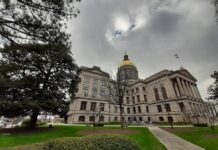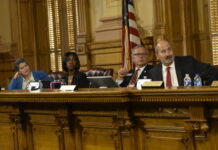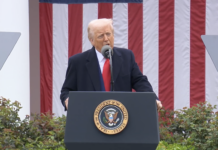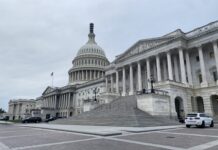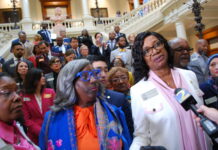
Stacey Abrams is running for governor of Georgia. Abrams announced her gubernatorial bid Wednesday ending months of speculation about her political plans.
Abrams enters the race as the leading Democrat, setting up a likely rematch against embattled Gov. Brian Kemp in a state controlled by Republicans that Abrams narrowly lost in 2018.
Considered a rising star within her party, Abrams announced her campaign Wednesday with a video called “One Georgia.” It touts her work since falling about 55,000 votes short of becoming the first Black female governor in U.S. history in the state’s last governor’s race.
“Regardless of the pandemics or the storms, the obstacles in our way or the forces determined to divide us, my job has been to just put my head down and keep working toward one Georgia,” she said.
The former state House minority leader saw her profile skyrocket in the aftermath of the 2018 election through her organization Fair Fight, which has led nationwide efforts around voting rights, the U.S. Census, redistricting and other political calls to action, which has raised more than $100 million since its launch.
Abrams’ announcement will likely clear the field of Democratic challengers, as her fundraising prowess, extensive grassroots organizing and overall popularity within the party all position her as the best candidate to flip the governor’s mansion.
Her opponent will most likely be Kemp, the former secretary of state who clashed with Abrams over election laws and access to the polls as voting rights became a central issue of the 2018 race that saw then-record turnout.
But the governor faces his own challenges around election issues, as former President Donald Trump’s vendetta against his narrow defeat in Georgia has led to at least two pro-Trump primary challengers and the threat of former Sen. David Perdue’s entry into the race.
Kemp did not take steps to overturn the 2020 election despite repeated overt and covert attempts by Trump and his allies to influence officials in battleground states he lost, and false claims of fraud with the election led to a measurable drop in turnout across rural conservative strongholds in the January 2021 runoff elections that saw two Democrats, Raphael Warnock and Jon Ossoff, elected to the U.S. Senate.
Abrams’ 2018 campaign was built on creating a coalition of typically non-voting voters of color across the state along with increasingly diverse suburbs that have seen massive population growth and ideological shifts to the left.
Over the past decade, 1 million new residents have flocked to Georgia, almost exclusively in nonwhite parts of metro Atlanta.
But as Republicans are in an all-out war over the ideological future of the party, Abrams’ polarizing plans for a progressive Georgia could prove to be a boogeyman that unites conservative voters behind Kemp and the eventual nominee for U.S. Senate to run against Warnock.
Several things are for sure: the governor’s race will be expensive, contentious and carry an outsize importance on the national political conversation for years to come.
This article appears on Now Habersham through a news partnership with GPB News.


